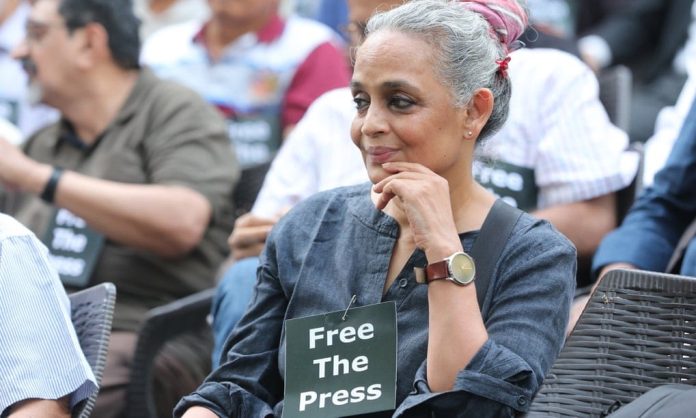More than 200 academics, activists, and journalists call for retraction of decision allowing prosecution of Booker Prize-winning author under UAPA
24 Jun. 24: More than 200 Indian academics, activists, and journalists have published an open letter urging the Indian government to retract its recent decision to prosecute Booker Prize-winning author Arundhati Roy under the country’s stringent anti-terrorism law, the Unlawful Activities Prevention Act (UAPA).
The group condemned the move and called on the government and democratic forces within the country to ensure the protection of fundamental rights to freely and fearlessly express views on any subject.
History professor Ajay Dandekar, one of the signatories, criticized the decision as unjustified, emphasizing that the Indian Constitution upholds Roy’s right to freedom of expression. The Samyukt Kisan Morcha, an umbrella group of farmer unions, and various civil rights groups, activists, and students in Delhi and Bengaluru have also voiced their support for Roy and condemned the prosecution decision.
Last week, Delhi’s lieutenant governor, Vinai Kumar Saxena, approved police action to prosecute Roy and academic Sheikh Showkat Hussain under the UAPA for remarks made at a seminar in 2010. Roy is reported to have stated that the disputed region of Kashmir had never been “an integral part of India.”
Roy, who gained international fame after winning the Booker Prize in 1997 for her debut novel The God of Small Things, has long been a vocal critic of successive Indian governments, including Narendra Modi’s administration. Her critiques span issues like capitalism, minority treatment, and globalization, earning her both praise and censure.
The decision to prosecute her under the UAPA, a law that complicates bail and often results in lengthy pre-trial imprisonment, has shocked many in India. Mukta Manohar, general secretary of the Pune municipality Safai union and a signatory of the letter, questioned the democratic nature of the country in light of the prosecution and emphasized the need to uphold constitutional rights.
In contrast, Arnab Goswami, a pro-Modi TV anchor, expressed his approval of the decision, labeling Roy as a “terrorist supporter” and “Maoist sympathizer.”
The timing of the prosecution, coming 14 years after the seminar and without recent provocation, has puzzled many legal experts. Supreme Court lawyer Sanjay Hegde noted the possible motivation to bypass the statute of limitations by using the UAPA. He expects the case to be challenged early in court, given the delay and the lack of resultant violence or criminal acts from Roy’s statements.
Human rights lawyer Colin Gonsalves also predicted the case’s likely collapse, citing the government’s inability to prove any link between Roy and acts of violence or state subversion.
Despite hopes for a more tolerant approach following Modi’s reduced majority in the recent general election, Hegde suggested the prosecution signals an even harsher stance against dissent. He warned that even if the case against Roy fails, it could intimidate critics of the government into silence under the threat of similar actions.




